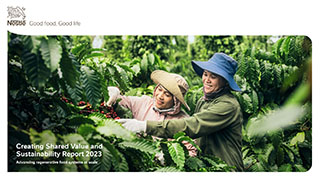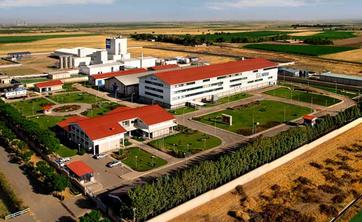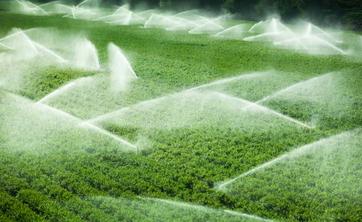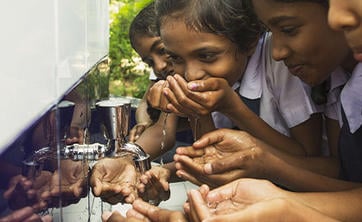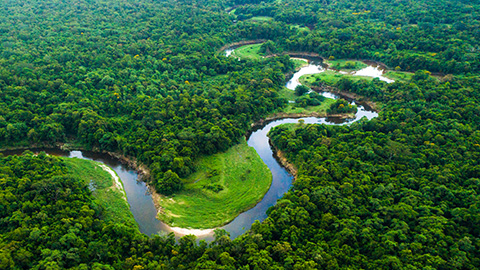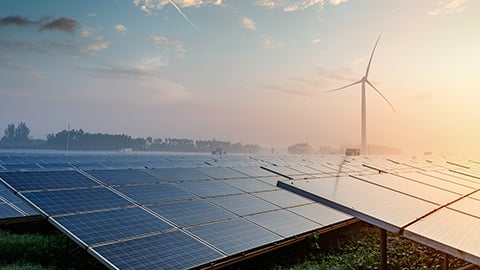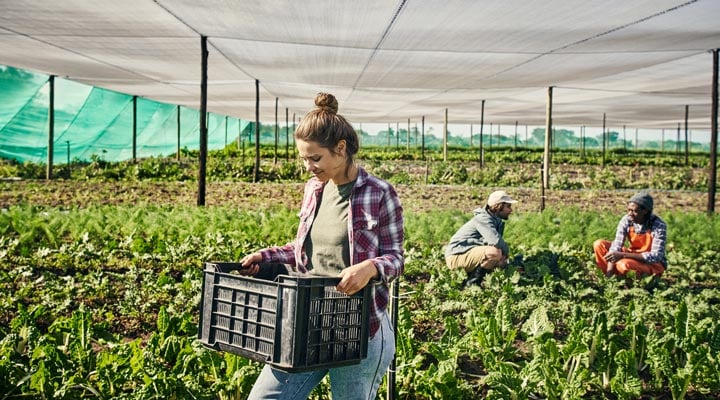Taking a holistic approach to water management

Climate change, population growth and land use changes are all putting accessibility to clean, safe water under pressure.
Water scarcity, where demand exceeds the amount available, is a growing challenge in many regions where we operate. Food and beverage production relies on water, with agriculture accounting for 70% of water withdrawals worldwide.
We depend on water throughout our agricultural supply chains and operations, and recognize our role in helping to protect water resources. We are improving water efficiency in our factories, helping farmers to introduce better water practices and increasing access to safe water and sanitation in communities near our operations and sourcing origins.
In particular, our Nestlé Waters business aims to lead the regeneration of local water cycles to help create a positive water impact everywhere it operates by 2025.
Our progress toward holistic water stewardship
Our approach to water management across Nestlé
Water stress is an issue in many parts of the world, with impacts felt locally by the communities and farmers who grow the ingredients we use in our products. Our approach to water stewardship must be local and context-based.
From local sources to wider catchments, we seek compliance as a minimum, leading to best practices in water resources management, and then collective action in our sourcing landscapes.
Water stewardship across Nestlé
Water is one of the five pillars of our regenerative agriculture framework. We aim to employ a holistic approach toward water across our operations, our bottled-water business, our agricultural supply chains and the communities they touch.
-
Factories We continuously strive to improve water efficiency at Nestlé factories by monitoring water use and the quality of the water we discharge. We aim to reduce water use in our factories by 6 million m3 between 2021 and 2023.
-
Nestlé Waters Pledge We will advance the regeneration of local water cycles to help create a positive water impact everywhere our water business operates.
-
Agriculture We promote and work with suppliers and farmers to implement better water management practices in water-stressed areas. This aims to protect watersheds and helps to go beyond the conservation of water to help regenerate water resources in the areas where we operate and source our ingredients.
-
Communities We believe businesses have a role to play in helping people access safe water supplies. Our Human Rights Salient Issue Action Plan puts water, sanitation and hygiene (WASH) at the heart of our water stewardship activities, both in our operations and supply chain.
-
Partnerships and advocacy We work together with local and global stakeholders to address shared watershed challenges.
Expanding efforts beyond our own operations
Climate change, higher water consumption, growing urbanization and damaged infrastructure are some of the factors contributing to the deterioration of natural water resources. These trends are interfering with the predictability of precipitation and the availability of clean water. Additionally, rising temperatures and more extreme weather patterns are causing more flooding and droughts.
We recognize water resources as part of a wider, shared and interdependent system. That’s why we go beyond our own operations to protect water resources, and their ability to support the natural environment, communities and the economy.
CEO Water Mandate
We are a member of the CEO Water Mandate, a UN Global Compact initiative that unites business leaders on water, sanitation and the Sustainable Development Goals.
Working with the Alliance for Water Stewardship
Nestlé is a founding member of the Alliance for Water Stewardship (AWS). Our representatives sit on the AWS Technical Committee, and contribute to specific Working Group (on agriculture for instance). Our representatives have also contributed to the work of the AWS Board and sit on the AWS Technical Committee.
Nespresso supporting community water access
We source our coffee from regions with favorable soil and weather conditions to grow high-quality coffees. Some of these regions are remote rural communities that lack access to the full range of services including safe water.
Together with our partners, we support the implementation of vital new infrastructure, through projects providing access to clean and safe water to rural communities in Guatemala, Mexico, Nicaragua and Colombia. In 2022 and 2023, we expanded these projects to El Salvador and The DRC. We continued to invest in Reviving Origins – our program to restore coffee farming in regions where it is under threat.

Landscape Enterprise Networks (LENs) in the UK
In 2022, we began a landscape project in East Anglia, UK, as part of Landscape Enterprise Networks (LENs). This holistic regeneration initiative aims to have a positive impact on water quality through planting cover crops and other regenerative agriculture activities at a landscape level.
Other water partnerships and advocacy
We work with water users and partners to advance water management, through a mix of nature-based and technical solutions to improve water quality or quantity and help create a positive water impact. We are members of:
- The World Bank Group’s 2030 Water Resources Group
- The CEO Water Mandate, a UN Global Compact initiative
- The WASH4Work initiative
- The Alliance for Water Stewardship
Nestlé is part of a global working group, convened by the World Resources Institute, to update the Volumetric Water Benefit Accounting method, which enables the assessment of benefits brought by water stewardship initiatives.

Looking ahead
Our strategic approach to water in agriculture aims to support our net-zero ambition and the related goal of sourcing 50% of our key ingredients through regenerative agricultural methods by 2030.
Building on the foundations already in place
Our agronomists continue to train farmers throughout our supply chains on regenerative practices that support efficient water management. We are also taking action where we have identified watershed preservation activities that we can take together with farmers and local stakeholders. These largely target watersheds where our supply chain is exposed to higher water risks and are aimed at both reducing farmers’ water use and increasing water availability.



